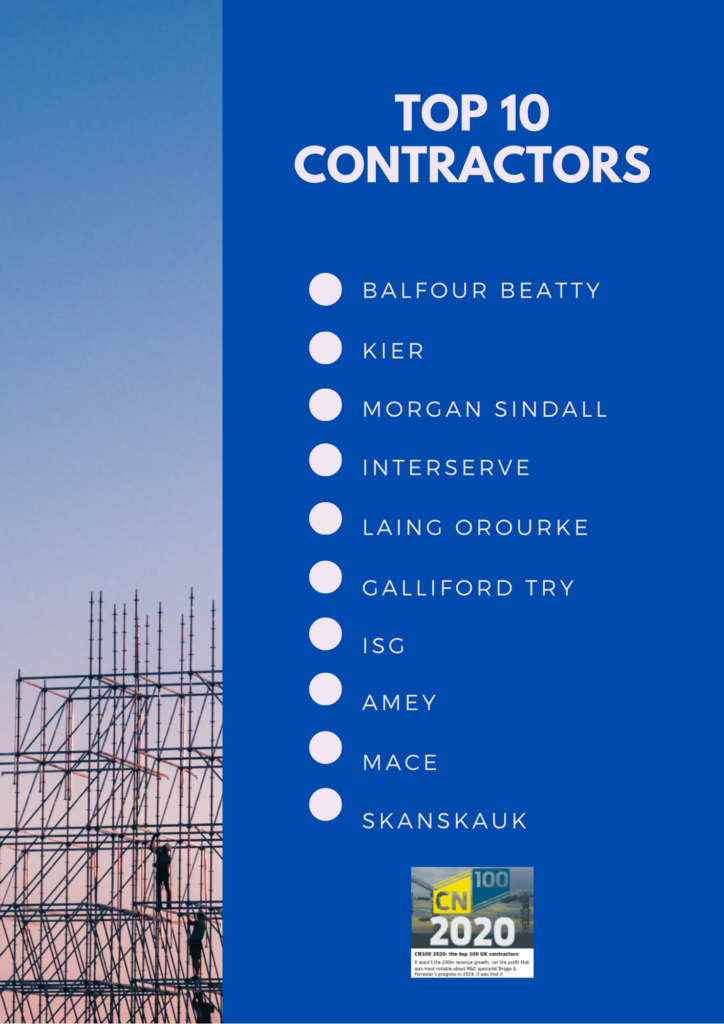A report by Construction News shows which firms are best prepared to ride out the uncertain times of a post- COVID construction sector and which ones might be swallowed up by debt and deals that went south.
Skanska UK, Bowmer & Kirkland, Balfour Beatty, Vinci, and Morgan Sindall all have something in common. Cash. According to Construction News’ annual report and survey of the top 100 Construction Contractors, the CN100, there has been widespread evidence of reduced borrowing and increased cash piles.
Show me the money
“The importance of this metric has prompted us to calculate, for the first time in the CN100’s history, a simple net cash/debt figure for each listed firm. As a group, the CN100 achieved an improvement in collective net cash from £3.24bn to £3.57bn,” said the report.
According to M&E firm Briggs & Forrester’s chief executive Paul Burton, 2019 was a monumental year not just for the firm’s £40m in revenue growth, but the company’s debt-free status.
“We want to be in control of our destiny,” says Burton in the CN report, who reveals the business paid off bank loans of just under £3m last year. “Cash is king, and it always has been,” he says.
The CN report stated that the rising number of construction industry insolvencies, from Carillion’s huge collapse in January 2018 to the failure of smaller firms such as Clugston last year, has turned cash into a much more closely watched figure. The seismic events of 2020 have only intensified its importance. DRS Bond Management director Chris Davies says: “At the moment, cash is almost the only metric.”
Local lockdowns and other factors
Other factors have also come into play, and that is viability in the midst of a pandemic and local lockdowns. One project that has been hit by the social distancing measures put in place across the UK is Lendlease’s 2022 Commonwealth Games athletes’ village project in Birmingham, which has been abandoned, due to time constraints caused by COVID-19. The recent news of localised lockdown measures in Birmingham has added to the dilemma that projects in the area are facing, with Lendlease announcing this week that it has had to make the tough decision to cut 15% of its UK workforce as a result of cancelled projects and project delays.
“The IR35 legislation around self-employed workers and the domestic reverse-charge VAT will also come into force in the coming months, further disrupting cash flow,” said the report.
Raising extra capital could be necessary for many contractors, in the short term to cover PAYE and VAT costs paired with those added by any workers deemed ‘inside IR35’.
Dr Nick Bell, a health and safety consultant and trainer for the UK construction sector, tells The Freelance Informer that freelancers in his area will likely be called upon for two reasons. The first is to take over permanent staff HSE training and implementation while they are having to deal with COVID-specific planning. The second is the potential onset of contractor redundancies to cut costs and looking to skilled consultants that can work on a project-basis alongside staff.
Bell says he had to upskill this year to take his business virtual and to simply survive, a move that has transformed his career and work-life balance. Look out for Bell’s story in an upcoming interview with The Freelance Informer.
No matter where you work within the UK construction sector keeping abreast of contractor financial health is time well spent because you can see growth projections and which skills will be in high demand on and off-site.
Here are the Top 10 ranked Contractors of the CN100:



